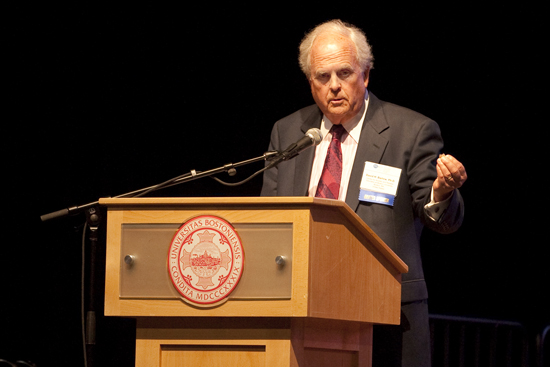Global Cognitive Therapy Conference Draws 2,000
BU’s Barlow: traditional psychotherapy’s hour is up

In the course of the next 10 years, the intuitive, far-ranging, and often costly talk therapy we know as psychoanalysis and the programs that teach it will give way to shorter-term behavioral therapies founded on hard scientific evidence, BU’s David Barlow told the more than 2,000 mental health professionals from 54 countries gathered at Agganis Arena Wednesday evening for the opening of the sixth World Congress of Behavioral and Cognitive Therapies.
Unlike traditional psychoanalysis, which can go on for years, or even decades, behavioral and cognitive therapies are geared toward problem-solving, with a focus on present thinking, behavior, and communication, rather than one’s childhood or past experiences. Although they’re unlikely to inspire HBO dramas or trigger the imaginations of a Woody Allen or a Philip Roth, behavioral and cognitive therapies suit the collaborative nature of the times and, practitioners argue, offer real hope for people marginalized by conditions like obsessive-compulsive disorder, severe anxiety, phobias, and addictions.
“The categories of diagnosis of psychiatric disorders will begin to fade away,” predicted Barlow, a College of Arts & Sciences professor of psychology and psychiatry and director of BU’s Center for Anxiety and Related Disorders. “Single diagnosis manuals won’t exist. We’ll have search engines everywhere for evidence-based treatments, Web-based training, and vastly increased collaboration across nations and cultures.”
A collaborative effort of BU’s behavioral and cognitive therapy specialists, the Association for Behavioral and Cognitive Therapies (ABCT), Harvard Medical School, and international colleagues, the four-day congress was kicked off with a lofty premise: “We are here,” said ABCT’s Stephen Hayes, “to alleviate human suffering on a global basis.” On a lighter note, as conferees took their seats in the arena they were serenaded by the Middlesex County 4-H Fife and Drum Corps and welcomed by congress organizers Michael Otto, a CAS professor of psychology, and Gail Steketee, a School of Social Work professor and dean, both dressed as Minutemen.
In his keynote address welcoming the global assortment of psychologists, psychiatrists, neuroscientists, and social workers, Barlow described the growth of behavioral and cognitive therapy from its birth in the 1950s, and the field’s halting progress from the pioneering operant conditioning theory and evangelical zeal of Harvard’s B. F. Skinner to Barlow’s mentor, Dr. Cautella. Behavioral therapy got a bad name early on from treatments involving, for example, electric shocks to cure hiccoughs. “We made mistakes and they set us back,” said Barlow. Prominent psychoanalysts at the time insisted that “you can’t apply science to human nature and the human spirit,” he said. What little science existed was not encouraging; Barlow cited the now-legendary Cambridge-Somerville Youth Study, which began in 1935 and followed nearly 500 boys for 30 years, into adulthood, to see if counseling and community programs lowered the chance of them getting into trouble. The researchers found that the programs made no difference; arrests and severe mental illness occurred in both treatment and control groups, and in some ways the treatment group actually fared worse.
To murmurs of assent from the audience, Barlow spoke of the evolution of neuroscience and behavioral medicine from the days when “we were ridiculed and called stupid.” Today, at BU alone, there’s a behavioral clinic with a staff of 90, a range of services at Boston Medical Center, hundreds of clinical scientists, and “the heads of psychology and psychiatry firmly in the scientific camp,” he said.
“I think we’re going to get much better at what we do,” he said, “and collaborate more than we ever have.”
The congress, which concludes Saturday, packs a diverse program of workshops, panels, roundtable discussions, poster sessions, and keynote addresses by leaders in the field, including Bjorn Paxling, of Vrije University of the Netherlands, who will speak this afternoon on frontiers of Internet-delivered cognitive behavioral therapy, and Terence M. Keane, of the VA Boston Healthcare System and a School of Medicine professor of psychiatry, who will discuss advances in the treatment of post-traumatic stress disorder.
Attendance is limited to registered participants only. More background and the World Congress program is available here.
Susan Seligson can be reached at sueselig@bu.edu.
Comments & Discussion
Boston University moderates comments to facilitate an informed, substantive, civil conversation. Abusive, profane, self-promotional, misleading, incoherent or off-topic comments will be rejected. Moderators are staffed during regular business hours (EST) and can only accept comments written in English. Statistics or facts must include a citation or a link to the citation.